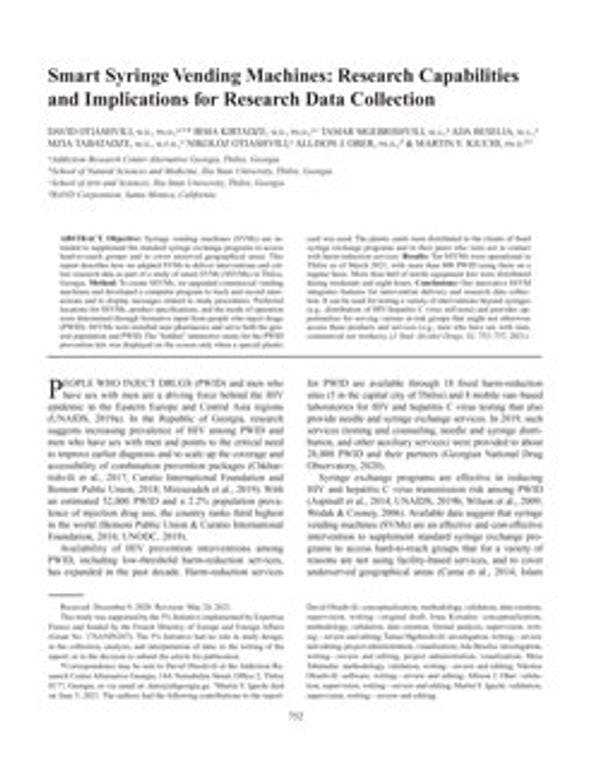Máquinas expendedoras de jeringas inteligentes: Capacidades de investigación e implicancias para recolección de datos
Otiashvili et al. sugieren que las máquinas expendedoras de jeringas son una herramienta valiosa para proporcionar implementos para la reducción de daños a poblaciones marginalizadas. Más información, en inglés, está disponible abajo.
By David Otiashvili, Irma Kirtadze, Tamar Mgebrishvili, M.A.,a Mzia Tabatadze, Nikoloz Otiashvili, Allison J. Ober, Martin Y. Iguchi
Objective:
Syringe vending machines (SVMs) are intended to supplement the standard syringe exchange programs to access hard-to-reach groups and to cover unserved geographical areas. This report describes how we adapted SVMs to deliver interventions and collect research data as part of a study of smart SVMs (SSVMs) in Tbilisi, Georgia.
Method:
To create SSVMs, we upgraded commercial vending machines and developed a computer program to track and record interactions and to display messages related to study procedures. Preferred locations for SSVMs, product specifications, and the mode of operation were determined through formative input from people who inject drugs (PWID). SSVMs were installed near pharmacies and serve both the general population and PWID. The “hidden” interactive menu for the PWID prevention kits was displayed on the screen only when a special plastic card was used. The plastic cards were distributed to the clients of fixed syringe exchange programs and to their peers who were not in contact with harm-reduction services.
Results:
Ten SSVMs were operational in Tbilisi as of March 2021, with more than 800 PWID using them on a regular basis. More than half of sterile equipment kits were distributed during weekends and night hours.
Conclusions:
Our innovative SSVM integrates features for intervention delivery and research data collection. It can be used for testing a variety of interventions beyond syringes (e.g., distribution of HIV/hepatitis C virus self-tests) and provides opportunities for serving various at-risk groups that might not otherwise access these products and services (e.g., men who have sex with men, commercial sex workers).
Click here to read the full article (restricted access).
